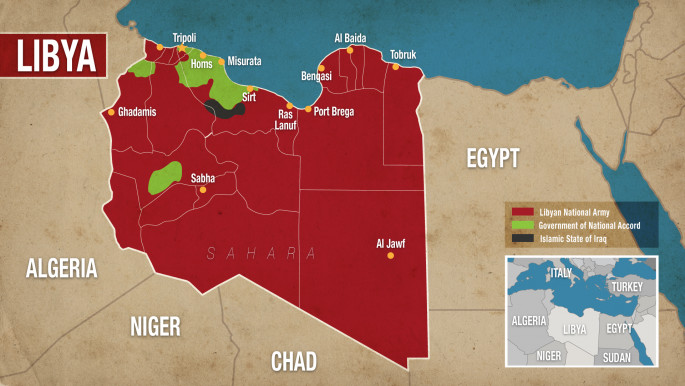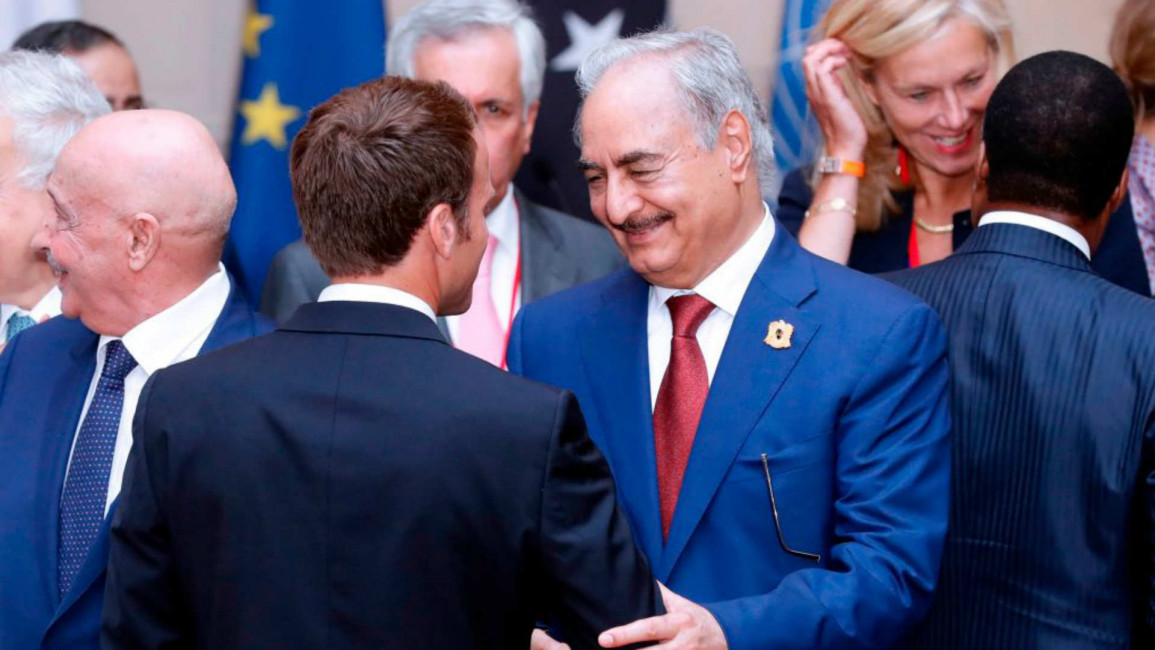
What is Frances's game in Libya?
The Government of National Accord (GNA) forces have so far managed to keep Haftar's forces outside of Tripoli, denying them the quick takeover of the capital they had initially hoped for.
The conflict has now reached a stalemate and is likely to become even more protracted, especially given the significant regional and international foreign interference fuelling it. Haftar's offensive on the capital Tripoli has been backed by a number of countries, most notably the UAE, Egypt and Saudi Arabia.
France seems to have gone against the trend of all other European countries by also siding with Haftar politically and militarily, finding itself in the same camp as Haftar's Arab backers. This, despite the fact that they officially recognise the GNA, who Haftar is fighting against, as the legitimate government of Libya.
Why would France - a country that helped the Libyan people in get rid of the dictator Gaddafi in 2011 - now support the potential rise of another despotic ruler, in the form of Haftar? Favouring a general who is seeking to return Libya to one-man military rule and dictatorship, is certaintly a contradiction of the democratic principles France stands for.
Historically, Libya has not come under France's geopolitical sphere of influence in Africa as it was never a French colony. There has been almost no French cultural influence in Libya, in comparison to other north and west African countries. Yet the European power has been very visible in its interference in Libya in recent years, especially since the February revolution of 2011.
 |
France seems to have gone against the trend of all other European countries |  |
What, then, are the drivers and motives of its recent policy vis-a-vis Libya? Are they economic, or ideological? Is this part of a wider strategy of global alliances, or an attempt to maintain influence in Africa?
Disagreement over policy towards Libya
France's policy in Libya after its heavy involvement in the 2011 revolution has been mainly seeking to gain political influence and secure economic interests. There are differing views within the French government about the best approach to achieve this, which have led to inconsistency in the government's strategy.
The French foreign ministry has publicly advocated full support for the GNA, and for achieving a resolution to the conflict through political dialogue. However, it has been reported that the defence ministry and French intelligence have also been actively providing support for Haftar's military campaign.
Read more: Haftar's battle for Tripoli leaves Libyans without respite over Ramadan
In 2016, France admitted that three of its special forces soldiers died in military action near Benghazi in the east of Libya, supposedly on an "intelligence-gathering mission". But their involvement clearly implied direct military assistance to Haftar, exposing the contradiction in France's declared official policy and its real actions on the ground.
Co-operation with Haftar may stem from the perception of him as a strongman and ally who would best serve French interests in Libya and the wider region.
Economic interests
Libya today has the highest proven reserves of oil and gas in Africa, and the ninth-largest globally, which offers a potentially lucrative market for western companies. France no doubt sees significant economic benefits to securing its interests in Libya, especially within the energy sector.
Macron's government has been pursuing contracts for its oil company Total, which substantially raised its presence in the Libyan energy market recently, with the purchase of a 16.3 percent stake in Libya's Waha oil field concessions from US Company Marathon Oil, for the value of US$450 million.
 |
|
It also has a keen interest in the southern region of Fezzan, which is believed to be rich not only in reserves of oil and gas, but also other minerals such as uranium and gold.
French support for Haftar likely sees him as a military strongman who is capable of bringing stability and security to Libya, which would be the best route to guaranteeing its current and future economic interests in the country.
Combatting extremism
Macron has consistently prioritised preventing violent extremism originating from Libya from reaching its shores over the question of migration, which does not affect France as directly as it does Italy.
There is a clear alignment between France and Haftar's narrative of being strong on tackling "terrorism", and eradicating Islamist groups from Libya.
In reality, however, this is a flawed understanding on the part of the French government, as it has in fact been the GNA that is mostly fighting religious extremism, evidenced by the total liberation of Sirte from Islamic State control in 2016.
European rivalries
There is also an ongoing rivalry between Italy and France over influence in Libya. The divergence in policy between the two countries is mainly over whether the priority should be on tackling migration or combatting religious extremis, and how a political settlement between the opposing sides in Libya should be achieved.
Competition also exists over securing economic benefits and interests, mainly in the oil and gas sector.
France sees Libya as an important neighbour to its former colonies and traditional allies in Africa, including Chad, Niger and Mali, as well as Tunisia and Algeria.
 |
The conflict has now reached a stalemate and is likely to become even more protracted |  |
It has been fearing spill over from the Libyan conflict, in terms of smuggling of arms across borders into these countries, which could threaten their stability and subsequently France's interests in this region.
Despite his trackrecord, and however misguided, France likely sees Haftar as a means to providing the stability, both inside Libya and the wider region, that would bolster the security of its nearby allies in Chad, Niger and Mali, and better secure France's interests in these countries.
A dangerous game
Macron's France is playing a dangerous game of dual-policy in Libya, by overtly recognising the GNA as the legitimate government, but covertly supporting Haftar in his campaign to overthrow this government.
In partnership with Egypt and the Emiratis, the French are gambling on Haftar succeeding in his current offensive, and achieving total hegemony over Libya.
They are hedging their bets on this in order to secure their own regional interests, albeit at the expense of the Libyan people's aspirations of building a civil and democratic state.
Guma El-Gamaty is a Libyan academic and politician who heads the Taghyeer Party in Libya and a member of the UN-backed Libyan political dialogue process.
Follow him on Twitter: @Guma_el_gamaty
Opinions expressed in this article remain those of the author and do not necessarily represent those of The New Arab.




